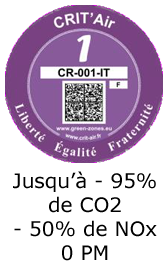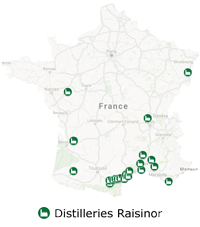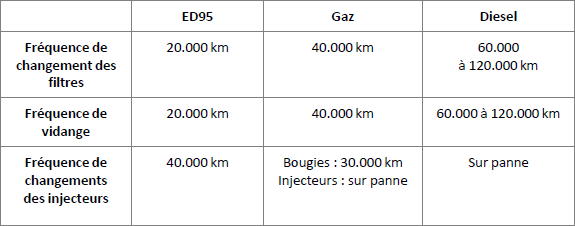
ED95
What do they do ?
A low-emission renewable fuel of renewable origin supported by the public authorities Critair

Certified in France since January 2016, the ED95 is composed of 95% ethanol and 5% non-oil additive.
The ethanol produced by Raisinor France Alcohols since 2007 is part of the 2nd generation ethanols, known as "advanced generation", since it is produced from vinous residues, a non-food agricultural resource.
As such, the ED95 produced by Raisinor France Alcools contributes greatly to fulfilling the European objectives of incorporating renewable energies in the transport sector.
A life cycle analysis that takes into account all the stages of fuel life from the harvesting of the raw material to the finished product has revealed a 95% reduction in CO2 emissions for ED95 produced by Raisinor France Alcohols by Compared to fossil diesel. Moreover, this fuel emits very little particulate matter (PM) and half less nitrogen dioxide (NOx).

The CRIT'AIR classification of vehicles places the Euro 6 ED95 vehicles in category 1. This allows ED95 vehicles to benefit from traffic advantages in cities that have implemented restrictions for improving air quality, In the same way as rechargeable gas and hybrid vehicles.
The finance laws adopted at the end of 2016 were an opportunity to recognize the interest of the ED95 fuel in an energy transition perspective. The ED95 now benefits from an advantageous tax regime with a TICPE rate reduced to 0.044 € / L for 2017 and the possibility for purchasers of vehicles to benefit from a 40% over-amortization of the value of the vehicle in the same way as Vehicles operating on natural gas.
A suitable engine available on a wide range of heavy vehicles
The Swedish manufacturer Scania is the first to be involved in the development of an engine adapted to the ED95. Today, it offers its 5th generation of ED95 engines available in a wide range of vehicles (bus and coach vehicles, waste collection vehicles, freight vehicles, construction vehicles).
Note that this is a non-substitutable fuel. Thus, a vehicle running on ED95 can not accept any other fuel.
The acquisition cost for a vehicle running on the ED95 is comparable to a diesel equivalent. However, an overconsumption of 30 to 50% compared to a diesel engine should be taken into account.
Supply Logistics and Vehicle Maintenance

The liquid nature of the ED95 facilitates storage and supply and therefore does not require any special training of fleet operators.
The fuel is stored in a tank which, depending on site constraints, may be buried or overhead. Supply is made by truck from one of the Raisinor distilleries (see map).
Filling is very easy in the same way as for a diesel or gasoline vehicle. The speed of refueling is interesting compared to the technical constraints of the recharging of an electric or gas vehicle, which is slower and can pose problems of saturation of the refueling stations. The ED95 can therefore prove to be a complementary solution to alternative energies or fuels.
It should be noted, however, that an ED95 vehicle must be the subject of a specific maintenance (see table below).

And other projects are in the pipeline…
Regular updates on the site www.jeroulepropre.com allow you to follow the progress of these experiments.



